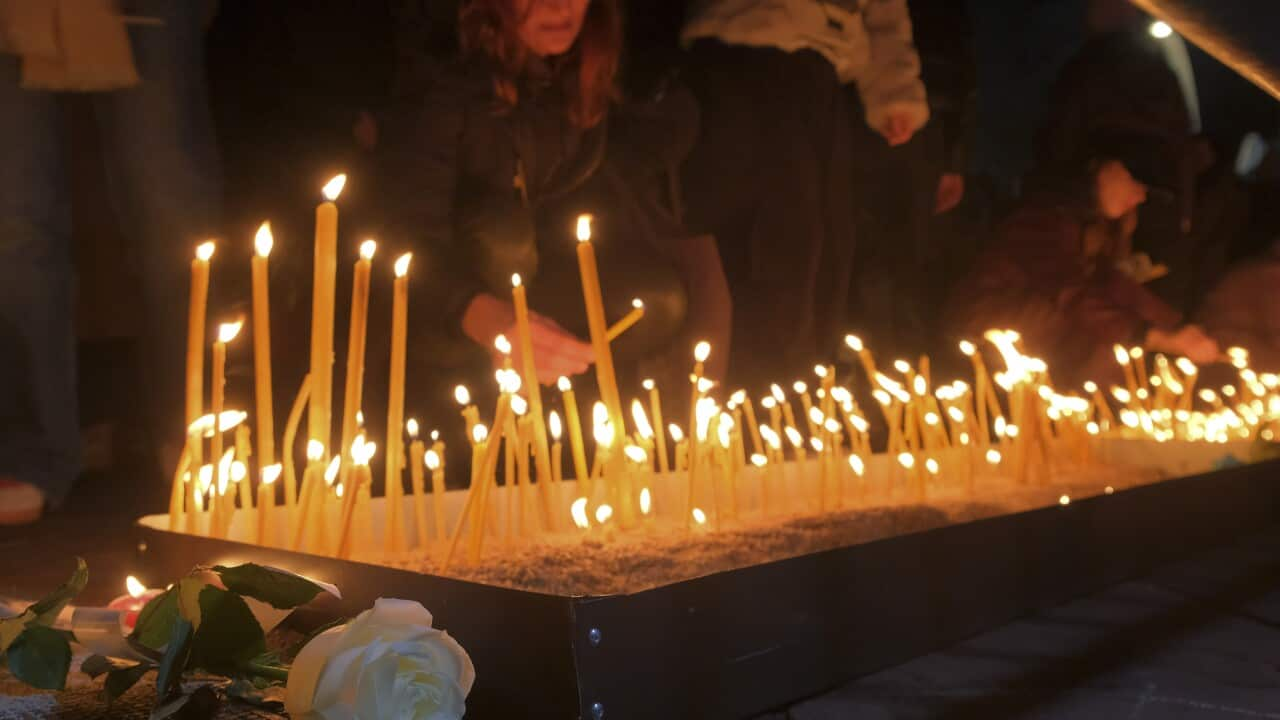Key Points
- A gunman in Montenegro has killed 12 people across five different locations before dying from self-inflicted wounds.
- The attacks started at a restaurant in the southern town of Cetinje after an altercation broke out.
- Montenegro has entered a three-day mourning period, with citizens joining to pay tribute to the victims.
This article contains references to suicide.
Montenegro has entered three days of national mourning, a day after a gunman killed 12 people including two children in a shooting rampage that started in a restaurant.
The 45-year-old attacker died after shooting himself when he was surrounded following an hours-long manhunt, police said.
“Twelve people were killed, of whom two were children,” prosecutor Andrijana Nastic told reporters in Cetinje, the small southern town where the killings took place.
The victims were killed at five different locations, with the first four in the restaurant where the shooting began, she added.
The rampage started around 5.30pm on Wednesday local time (3.30am AEDT on Thursday) at a Cetinje restaurant, police chief Lazar Scepanovic told a press conference on Thursday.
Cetinje is in the south of Montenegro. Source: SBS News
Police initially rushed to a nearby village after being wrongly informed that the restaurant was located there, he added.
Most of the victims, all killed within some 30 minutes, were the gunman’s “acquaintances, friends, godfathers and closest relatives” including his sister, Scepanovic said.
Police said the two murdered children were aged eight and 13.
Four people were also seriously injured and received hospital treatment in the capital, Podgorica.
The attacker initially shot dead four people at a restaurant in Cetinje. Source: AFP, Getty / Savo Prelevic
On Thursday, all four were at an intensive care unit and their lives were in danger, a hospital statement said.
Tributes for those killed
Locals expressed shock at the atrocity. In the evening, a few hundred residents gathered in silence in the central part of Cetinje, lighting candles for the victims.
Citizens also gathered in other towns across the country including Podgorica, where several hundred people lit candles in the main square and signed a book of condolences.
“To kill children. .. is completely senseless. That is not a crime, it is something more than that,” one man told Agence France-Presse.
“What can I say about this case? Sadness, sadness, silence… This is not the first case. All of this is a consequence of uncontrolled arms-carrying,” said another.
Montenegro’s prime minister has declared three days of mourning. Source: AAP, AP / Risto Bozovic
Police said earlier that the suspect had been drinking all day long before an altercation broke out between him and another restaurant guest.
He left to take a weapon before returning to kill four people at the restaurant and then moving on to the other locations, Scepanovic said.
Illegal weapons an ongoing issue in Montenegro
Prime Minister Milojko Spajic said the shootings erupted after a restaurant fight “went wrong”, labelling them a “terrible tragedy”.
He raised the prospect of a review of the country’s gun ownership laws, including considering a complete ban on the possession of weapons.
The country’s National Security Council is to meet on Friday to review “key challenges in the detection and seizure of illegal weapons” as well as the recruitment of additional police officers, a government statement said.
The attacks took place in the village of Bajice, near Cetinje, on New Year’s Day. Source: AFP, Getty / Savo Prelevic
Scepanovic said on Thursday that the gunman had a history of possessing illegal weapons, some of which were seized from him in 2022. He had been sentenced to three months in jail but appealed the verdict.
According to the Small Arms Survey, a Swiss research program, there are approximately 245,000 firearms in circulation in Montenegro, a nation of just over 620,000 people.
In 2022, a man murdered 10 Cetinje residents, including two children, in broad daylight before being killed, in one of the deadliest such incidents to rock the country.
Cetinje, with a population of around 13,000 people, is the site of the former royal capital and sits in a mountainous valley that has largely stagnated economically.
Readers seeking crisis support can contact Lifeline on 13 11 14, the Suicide Call Back Service on 1300 659 467 and Kids Helpline on 1800 55 1800 (for young people aged up to 25). More information and support with mental health is available at and on 1300 22 4636.
supports people from culturally and linguistically diverse backgrounds.




